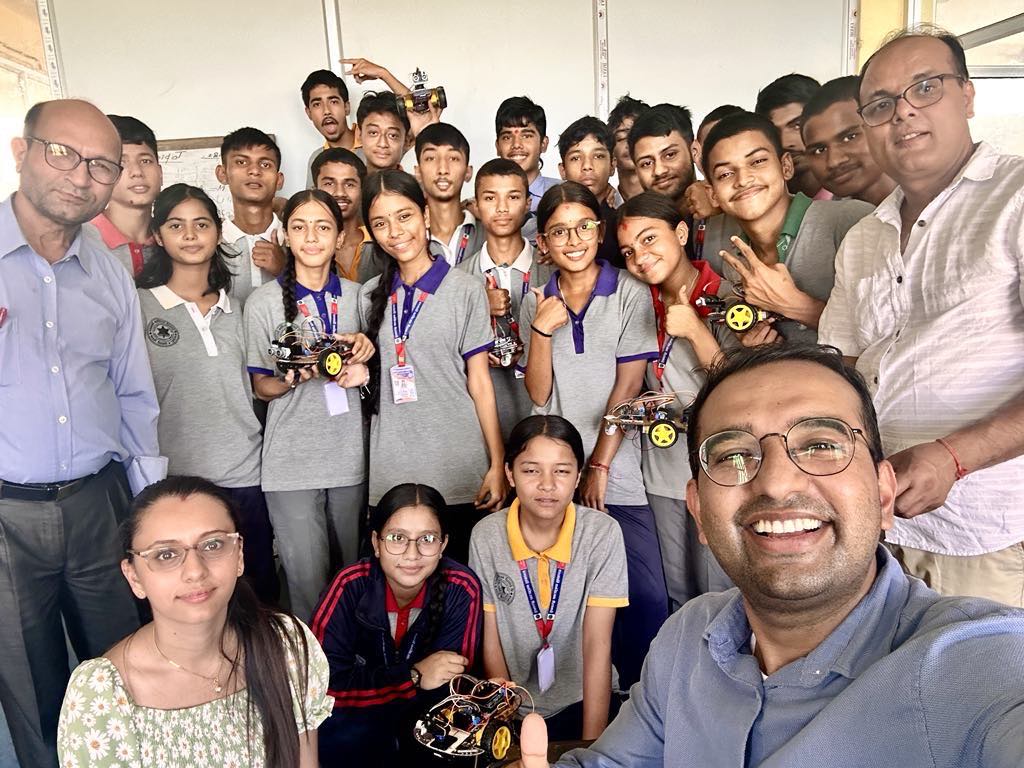

CHITWAN: A pioneering robotics workshop recently held in three Chitwan schools introduced around 155 students to the fundamentals of robot building and programming. Jointly led by Prakash Subedi, a Technical Project Manager in BMW’s 5G Research and Development team, and his wife, Srishti Gaihre Subedi, a Senior Software Engineer at SAP, the initiative offered students a hands-on glimpse into the world of engineering. After returning from Germany, the couple volunteered their expertise to inspire young minds in Chitwan, conducting this free training to foster enthusiasm for technology and robotics.
The program was supported by the German organization GIZ, Diaspora 2030, and the Education Development and Coordination Unit, Chitwan, under the Ministry of Education, Science, and Technology, providing local students a unique opportunity to engage with cutting-edge science and technology over an intensive 15-day training period. The workshops, held at SOS Hermann Gmeiner School Bharatpur, Narayani Model Secondary School, and Prembasti Secondary School, reached students from grades 7 to 11, primarily in grades 9 and 10. Each student learned to build and program obstacle-avoiding robots using kits containing Arduino Uno microcontrollers, ultrasonic sensors, servo motors, motor controller boards, and motors.
The immersive experience allowed students to gain practical skills in electronics, coding, and robotics, while also encouraging them to explore engineering, artificial intelligence, and problem-solving approaches.
Prakash noted the importance of hands-on learning, saying, ‘In Germany and other European countries, it’s common for students to get practical experience in robotics and programming. However, such opportunities are rare in Nepalese schools. We wanted to provide students with a sense of what’s possible in engineering, AI, and problem-solving, helping them understand how technology can be used to tackle real-world challenges and inspiring them to pursue these skills beyond the classroom.’ Approximately 40% of participants were girls, indicating a growing interest among both genders in technical fields.
The project was made possible with support from the Diaspora 2030 initiative, which connects skilled diaspora professionals with their home countries to foster positive change in education, technology, and skill development. Saurav Koirala from GIZ Kathmandu expressed his happiness with the achievements of the project, highlighting its alignment with Sustainable Development Goal (SDG) 4, which promotes quality education. He remarked that projects like this are vital in raising local educational standards and inspiring students to explore STEM fields.
Srishti emphasized her dedication to gender diversity in engineering, saying, ‘There are very few females in engineering, and I wanted to motivate students – especially girls – to explore this field.’She shared an emotional moment from the workshop when Bikisha Acharya, a trainee from Prembasti Secondary School, expressed her desire to become an engineer like Srishti. ‘It was a very touching experience for me,’ Srishti said. ‘Knowing that we are inspiring young girls to see themselves in these roles is incredibly meaningful.’
The training concluded with a robotics competition titled ‘Robo-Quest 2024: Ignite the Spark’ at SOS Hermann Gmeiner School. The competition featured 55 students selected from an internal evaluation among the trainees, forming six teams of three from SOS, Narayani Model, and Prembasti schools. SOS Hermann Gmeiner School emerged as the winner, securing a cash prize of 5,000 NPR, with Prembasti Secondary School and Narayani Model Secondary School securing the second and third places, winning 4,000 and 3,000 NPR, respectively.
Bishnu Prasad Bhattarai, Unit Chief of the Education Development and Coordination Unit, Chitwan, and Bhumi Lal Sharma Subedi, Undersecretary at the Ministry of Education, Science, and Technology, praised the initiative, stating, ‘Training and competitions like these attract students toward science and technology. With AI and robotics transforming industries, it is essential for students to gain foundational knowledge in these areas even at the high school level.’
This program has left a lasting impression, inspiring students and educators alike, and marking a significant step forward in bringing technological education to Chitwan.